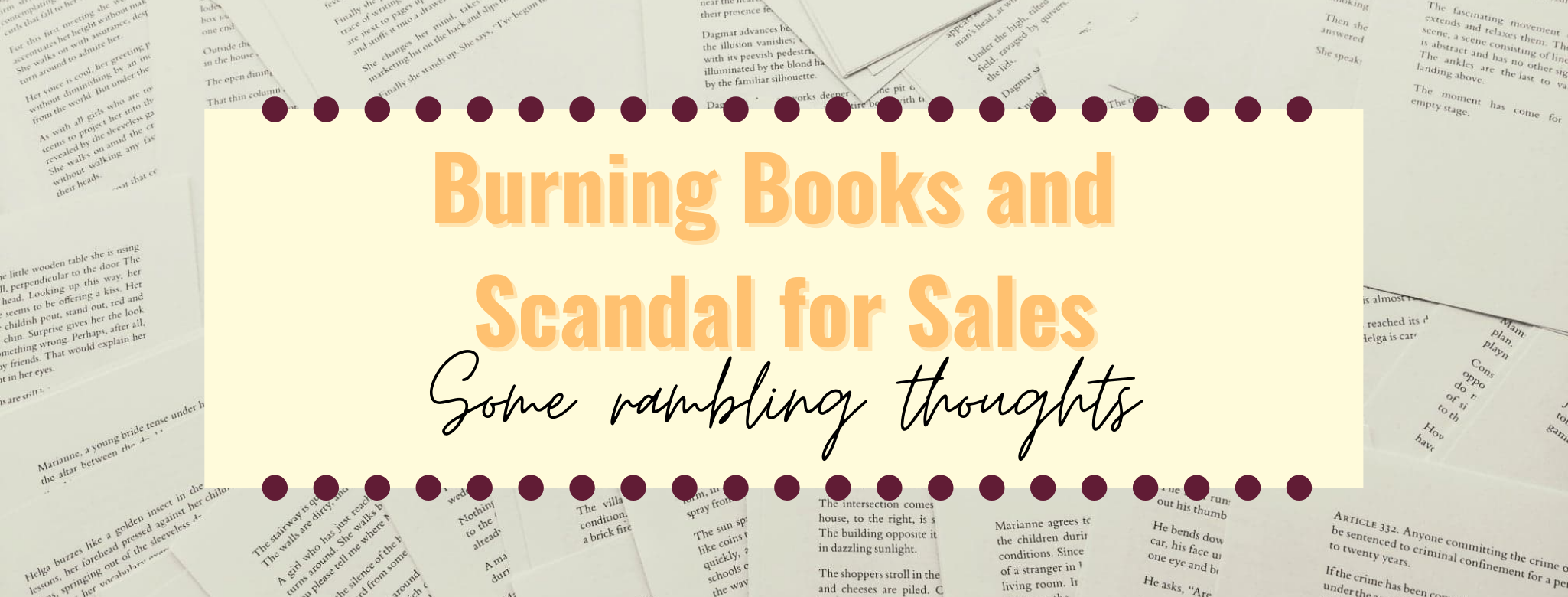The new wave of Shifting Sands is out! You can find it here under the Shifting Sands tab, or sign up for each wave to be sent to you through a newsletter, which you’ll find in a pop up to the right.
How do we feel about book burning? I’d imagine that, for most of us, it draws on negative connotations of Nazi regimes and censorship of media. Early on in my PhD, I read a great deal on books as authority, meaning a lot about book bans and burnings. In most cases, there’s a sense of trying to control what the potential reader might take in. A “think of the children” moment, if you will. The author writes something with the potential to incite the “wrong” views and so the bans and burnings come in to limit the damage. But what do we do if it’s the author setting up a bonfire of their own books? As this recently happened, creating uproar on book Twitter, it’s got me thinking. Why would an author burn their own books? Have we moved beyond an author “tribe, and into scandals for sales?
A Bonfire of Books
I’m a couple of weeks late on this. It all quite literally went on flames shortly after my last blog, just as I was preparing to take time away. A British novelist posted images of her own, newly republished books up in flames. She noted that she was burning them because she hated the blurbs. They, in her eyes, miscommunicated her work and made it appear to be “wimmins fiction of the worst kind”. The blurbs failed to capture how ‘innovative’ she was at the time, making her work sound Mills and Boon-esque and “suburban”. The author claims that burning the books was symbolic. A personal reaction to the “cosy” new blurbs turned public.
I honestly don’t know how I feel about the book burning in this case. It feels somewhat distasteful due to the typical connotations with book burning but, as much as it feels somewhat pretentious to me, there is a kind of artistry to it. Banksy, after all, did something similar in the art world. If he can destroy his work immediately after selling it(!), why shouldn’t someone else destroy their work before it is sold? It feels somewhat wasteful, but with the right message, it could work. In this case, however, I don’t think the message was right, and this is what led me to wonder whether this scandal was for sales purposes.
Why “wimmins” fiction?
I keep trying to rationalise this author’s actions so that it doesn’t just seem like stirring up conflict for sales. I’ve been reading a lot about context collapse recently. When we post online, we’re speaking to many audiences. They don’t always get to see the context of our words, and thus lack a full understanding. And, in some ways, I see similarities here for a couple of reasons. First, there’s the obvious: I might not be getting the full context here. I don’t know this author, haven’t really read her works, and so may not understand the upset. Maybe one of her books has a phoenix metaphor in there that I’m missing? Because that would at least help make her message makes some sense. Without it, I’m struggling to see what she intended when she burned her books for seeming like “wimmins” fiction.
Honestly, it reminds me a lot of undergrad. We had one lecturer who dismissed those writing genre fiction as doing it for the money. True writers don’t make money, you know. There’s a distinct air of snobbery there, but also a rather confused point. What’s wrong with trying to make a career out of writing? And, as a supposedly feminist writer, what’s wrong with women’s fiction? I just don’t get why one form of writing is dismissed as lesser than another. Even less so when it’s specifically being pushed into gender lines. It just makes no sense to me and I find it far more annoying than the actual book burning itself. Why, author who claims to be feminist, are you dragging other women down? (Let’s not even get into the fact that the author likely had several earlier opportunities to get the blurbs corrected!)
Meaning and Context
I understand concerns about being misrepresented. A book’s cover design and blurb should reflect what’s inside to try and draw in the right audience. Very important when republishing something! But, as an author, you can’t always control the context in which a reader finds your book. Time changes meanings. I’ve mentioned previously that there were aspects of Shifting Sands (here!) that even my interpretation changed for as I moved from writing to editing. My context had shifted. I moved from someone writing to get the story out into someone living through a global pandemic, with all that brought. No doubt, if someone reads it five years from now, there were be things in there that are seen completely differently due to that shifted context.
In the case of this author’s work, part of the upset seemed to be the lost acknowledgement of the progressive elements included. In the articles and threads I’ve read about the subject, she lamented that acknowledgement of her “before time”-liness had been lost. But perhaps her publishers saw a new context for her work, in a society that (while by no means perfect) has progressed somewhat from the original time of writing. Perhaps they wanted to shine light on her writing by bringing it into a new context. We can’t fix how readers see our work. The meaning will always shift across time, culture, and individual understanding. And I don’t think that’s necessarily a bad thing.
Scandal Creates Sales?
Another… interesting aspect of this is the whole fact it’s a scandal. The action of burning books along with the words associated were, pardon the pun, purposefully incendiary. Sure, the author claims that she was doing it symbolically for herself, but then she needn’t have posted on social media. No, there was purpose behind the posting, and this, to me, connects back to JKR. Two authors, both of whom seem to like commenting on the word “women” and both courting scandal ahead of book releases. I don’t know if it’s just me, but I see similarities there.
I did some reading, trying to work out if the old adage of “all press is good press” was actually true for branding nowadays and found mixed results. Most research seemed to suggest that negative attention led to fewer sales of a product overall, but better sales for lesser known products. But then this is contrasted by the fact JKR’s latest novel apparently sold 65, 000 copies within the first five days. She’s definitely well-known, but would she have had that level of success without the scandal? Is it that, with the polarising argument JKR is inserting herself into, there were those who bought her work to show support? Maybe this is the way we’re going to see book marketing go from now on. I hope not. I’ll be keeping my eye out to see if there are more incidents like this to follow though.
So, over to you. Have you seen other incidents of this scandal for sales model?



